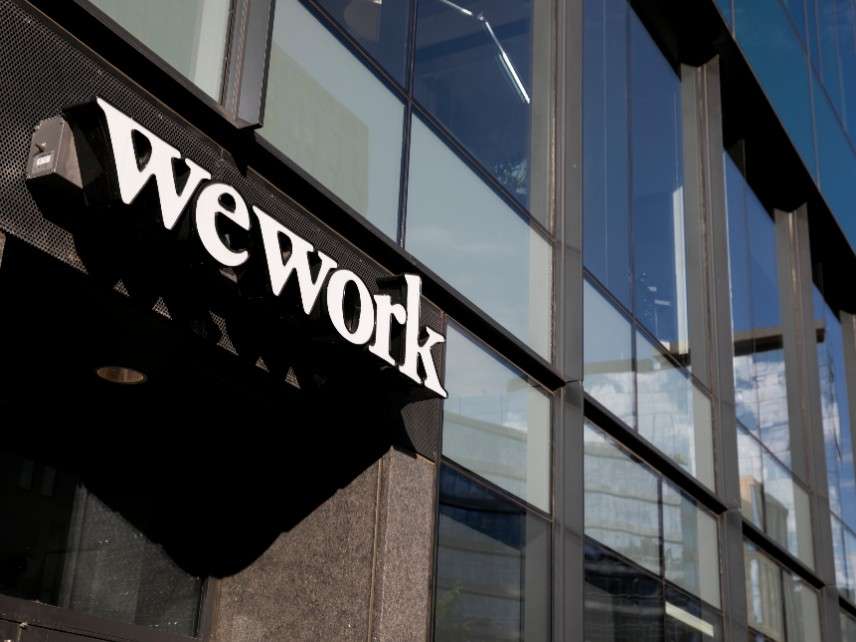Is a Company's Choice To Go Vegetarian Really 'Every Libertarian's Nightmare'?
WeWork's efforts to influence employee behavior might rate as stupid, but they're not tyranny

WeWork has gone (mostly) vegetarian. The company, which provides shared office spaces and similar services across the United States and in nearly two-dozen countries, announced last month it was pulling its food dollars out of most meat.
"The company will no longer serve red meat, pork[,] or poultry at company functions, and it will not reimburse employees who want to order a hamburger during a lunch meeting," the New York Times reported. The ban doesn't apply—for now at least—to "seafood, eggs, dairy and alcohol."
A company spokesman says the move has to do with a range of factors—from environmental concerns to animal welfare.
To be clear, WeWork isn't banning its employees from eating meat. Rather, the company will no longer buy meat or reimburse its employees for work meals that contain the forbidden meats. Employees are still free to eat meat on their own dime and, certainly, on their own time.
WeWork's policy doesn't exactly break new ground. Over the years, a variety of companies have implemented policies banning alcohol, soda, microwave popcorn, and even snacks from some or all premises. Many large employers participate in Meatless Mondays, including Subway, Chipotle, Sodexo and Aramark. But, as the Times notes, "WeWork appears to be the first big company to tell its employees what they can and can't eat."
Critics were quick to pounce.
Slate's Felix Salmon dubbed WeWork's policy a "tyrannical…. corporate ukase of dubious utility" in a piece last month. One of the most compelling points Salmon makes is a practical one—namely, that WeWork employees who wine and dine potential business partners around the world will no longer be allowed to pay for many of the meals those potential partners may wish to eat. That might rate as stupidity, but it's not tyranny.
Still, Salmon makes a good case that the policy demonstrates WeWork's wealthy owners may be as out of touch and full of themselves as this environmental campaigner. Or maybe this one.
"It's arrogant paternalism of the highest order for a billionaire American co-founder, one whose own personal carbon footprint is surely in the top 0.1 percent of global citizens, to impose his own preferred environmental solution on thousands of employees who were probably doing much better than he was, on that front, all along," Salmon writes.
Critics of the plan also include WeWork members, the term the company uses for those who pay to use its offices spaces.
"If you want to do that stuff, keep it in San Francisco where it belongs," said Christen Springs, a Houston, Tex. WeWork member whose family owns cattle in the state, in comments last month to the Houston Chronicle. (The paper also noted that WeWork sponsored Houston's Southern Smoke barbecue festival last year.)
Perhaps the most bizarre criticism of the WeWork policy comes from Vanity Fair's Maya Kosoff, in a piece under a headline that calls WeWork's policy "every libertarian's nightmare."
That's the sort of insight that could only come from someone who gained all of their understanding of libertarianism from watching Nick Offerman as the cranky, big-hearted carnivore Ron Swanson on Parks & Recreation.
But the bigger point about the Vanity Fair piece is, I think, that WeWork's policy isn't anti-libertarian in any way whatsoever. In fact, I find it to be an exceptionally libertarian policy.
"I think companies that live and express their commitments through work-space policies should be celebrated, even if the specific choices they make might alienate employees and customers," Reason Editor at Large Nick Gillespie told me by email this week. "As someone who is libertarian and tries to eat vegan—and a journalist who is always looking for a free meal—I think WeWork's policy is extremely appealing.
"Contra Maya Kosoff in Vanity Fair, who calls the new policy 'every libertarian's nightmare,'" Gillespie says, "WeWork isn't taking any choices away from its employees even as it gives them plenty to chew on."
Back in 2005, Reason hosted a fantastic debate between John Mackey (Whole Foods), Nobel Prize-winning economist Milton Friedman, and Cypress Semiconductor honcho T.J. Rodgers on the subject of corporate social responsibility. The debate centered on Friedman's famed contention that the only responsibility of business is to maximize profit. I thought Mackey made the most compelling argument of the trio when he asserted that "the enlightened corporation should try to create value for all of its constituencies"—including customers and employees, and not just investors. Those ideas, expressed both in Gillespie's comments and WeWork's policy, are increasingly in vogue.
Is WeWork's policy right or wrong? Maybe. There are arguments about whether or not a plant-based diet is better for the environment—ideas that lie at the heart of the company's policy. As I note in my recent book, Biting the Hands that Feed Us: How Fewer, Smarter Laws Would Make Our Food System More Sustainable, "research by faculty at Carnegie Mellon University has cast some doubt on the long-held belief that fruits and vegetables are inherently more sustainable than meat."
But any company, including WeWork, is and should remain free to act on these or other beliefs so long as, like Gillespie suggests, it's not squashing its employee's choices.
If WeWork is right, the company will continue its impressive growth and likely attract and retain good employees who buy into its work and mission. Alternately, though, the company may be just as likely to lose employees for butting too far into their food choices. Either way—regardless of what Vanity Fair tells you—WeWork's new policy is nothing more than the free market at work.


Show Comments (341)